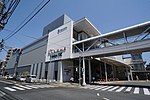Camp Zama
Buildings and structures in Kanagawa PrefectureBuildings and structures in SagamiharaHeliports in JapanInstallations of the United States Army in JapanTransport in Kanagawa Prefecture

Camp Zama (キャンプ座間) is a United States Army post located in the cities of Zama and Sagamihara, in Kanagawa Prefecture, Japan, about 40 km (25 mi) southwest of Tokyo. Camp Zama is home to the U.S. Army Japan (USARJ), I Corps (Forward), U.S. Army Aviation Battalion Japan "Ninjas", 311th Military Intelligence Battalion, Japan Engineer District (U.S. Army Corps of Engineers), 78th Signal Battalion and the Bilateral Coordination Department and 4th Engineer Group of the Japan Ground Self-Defense Force.
Excerpt from the Wikipedia article Camp Zama (License: CC BY-SA 3.0, Authors, Images).Camp Zama
Ishinomaki Avenue, Sagamihara Minami Ward
Geographical coordinates (GPS) Address Nearby Places Show on map
Geographical coordinates (GPS)
| Latitude | Longitude |
|---|---|
| N 35.513833333333 ° | E 139.39366666667 ° |
Address
Kastner Army Air Field
Ishinomaki Avenue
252-0011 Sagamihara, Minami Ward
Japan
Open on Google Maps









